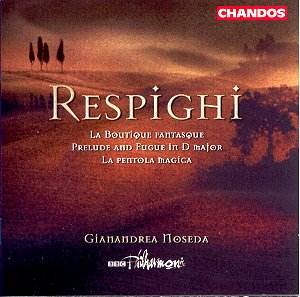I
approached this release with more than a little trepidation as
the only evidence of Noseda’s work with the BBC Philharmonic was
a freebie given away with a recent issue of the BBC Music Magazine,
of works by Prokofiev including a dreary performance of the 5th
Symphony.
I
need not have worried though as this Chandos release is in a totally
different class. I have never heard Respighi’s best known transcription
in a better performance – it glitters and has a tremendous sweep
from start to finish and outclasses all of the competition including
Bonynge on Decca, the previous normal first choice. The BBC/Chandos
recording has captured every nuance of this performance, and all
associated with this release can be immensely proud of the results.
The
ballet is given complete, with all of the bridging passages intact,
sometimes omitted in recordings of the suite which has often been
released.
The
story of the ballet covers the life in one day in the life of
a toyshop. Foreign visitors to a Toyshop in Nice about 1865 are
enchanted by the magical qualities of the toys on display which
are demonstrated by the toyshop owner. The pièce de
resistance is two cancan dancers who so impress the visitors
that they make bids for the two characters, and it is agreed that
one dancer should go to each of the two customers. They are packed
up separately as evening approaches. Unknown to all but us and
the collective toys, the two cancan dancers are in love and distraught
at having to be separated.
Once
the shop has been closed for the night, the toys all come to life
and reunite our hapless dancers, and they as a Hollywood script
would say "dance the night away." Come morning, the
dancers abscond and when customers return for their purchases,
they are so angry that they start to attack the unfortunate owner.
The toys however come to life and protect the owner by driving
the customers from the store. Needless to say, the cancan dancers
reappear and everyone is united again.
The
second ballet on the disc, La pentola magica (The Magic
Pot). The ballet is in the form of a series of Russian themes
in the style of lesser known Russian composers. The ballet was
never performed during Respighi’s lifetime and seems to have been
written for the composer’s own enjoyment.
Needless
to say, the lyrical inspiration is not at the level of La Boutique
Fantasque, but it is well worth the airing it gets in this
superb issue. The orchestration is typical Respighi – strings,
a small complement of woodwind and brass, percussion, celesta
and harp.
The
disc is rounded off by a very impressive reading of Respighi’s
well known transcription of Bach’s Prelude and Fugue BWV 532.
Respighi had a bit of a thing with transcribing works by J. S.
Bach, and this Prelude and Fugue is a superb example of Respighi’s
skill at converting well known and well loved music into a new,
fresh piece of music which can be listened to in its own guise
without sounding like an arrangement. Respighi, a keen organist
in his early days understood well not only the themes and construction
but also the gut-wrenching effect of Bach at his greatest. This
transcription delivers the goods in abundance, and I can thoroughly
recommend this superb example of Chandos’s technical and musical
skill, to say nothing of the wonderful performances by the BBC
Philharmonic Orchestra and their new chief conductor. More please!!!
John
Phillips
